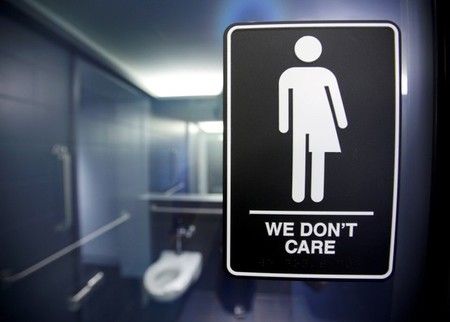Advertisement
Transgender student asks U.S. high court to keep out of bathroom case

By David Ingram
(Reuters) – Lawyers for a transgender high school student in Virginia asked the U.S. Supreme Court on Tuesday to keep out of a legal dispute about bathroom rights, an issue that has emerged as an increasingly divisive one in the United States.
In court papers, lawyers for the student, Gavin Grimm, urged the Supreme Court to leave in place a lower court’s order in favor of Grimm while the litigation goes on.
The case is the first time the fight over transgender bathroom rights has reached the Supreme Court.
Last year, the American Civil Liberties Union (ACLU) sued on behalf of Grimm to challenge the Gloucester County School Board’s bathroom policy, which requires transgender students to use alternative restroom facilities.
Grimm, 17, was born a girl but now identifies as male.
A federal district court in June ordered the school board to allow Grimm to use the boys’ restroom for now, and this month the school board asked the Supreme Court for an emergency stay of that order.
Seeking to keep the order in place, ACLU lawyers wrote that no “irreparable harm” will occur if the Supreme Court keeps out of the case and Grimm uses the boys’ bathroom.
“In every context outside school, he uses the boys’ restrooms, just like any other boy would,” they wrote.
The school board’s application for a stay was directed to Chief Justice John Roberts, who has responsibility for emergency actions that arise from the appeals court that covers Virginia. Roberts could act alone or refer the matter to all eight justices. Five votes are needed to grant a stay application.
In court papers this month, the school board’s lawyers said the lower court wrongly deferred to President Barack Obama’s administration’s view that prohibitions on sex discrimination under federal law also apply to gender identity.
In May, the Obama administration directed public schools nationwide to allow transgender students to use bathrooms that correspond to their gender identity or risk losing federal funding. So far, 23 states have sued to block the directive.
Separately, the Justice Department sued North Carolina over a state law requiring people to use public bathrooms that correspond to the sex on their birth certificates.
An April ruling by the Richmond, Virginia-based 4th U.S. Circuit Court of Appeals in favor of Grimm was the first by an appeals court to find that transgender students are protected under federal laws that bar sex-based discrimination.
(Additional reporting by Lawrence Hurley in Washington)











